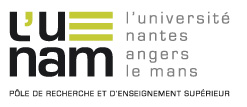Cultivation and biorefinery of cyanobacteria isolates from Qatar for the production of pigments and bio-bitumen in desertic environment
Culture et bioraffinerie d'isolats de cyanobactéries du Qatar pour la production de pigments et de bio-bitume en environnement désertique
Résumé
Extremophilic marine cyanobacteria are potential candidates for their solar cultivation in hot desertic environment, providing a sustainable solution to the lack of arable land and fresh water, for the production of valuable natural pigments such as phycocyanin in the Arabic Peninsula. In this context, this thesis evaluates the potential of four cyanobacteria isolates from Qatar. Their growth and phycobiliprotein productivities are first studied indoor using photobioreactors at different temperatures and salinities, allowing the selection of a thermotolerant and halotolerant strain, able to produce phycocyanin rich extracts with remarkable antioxidative properties. After this screening step, the outdoor solar cultivation of the selected cyanobacteria is studied in Qatar using urea as a low-cost nitrogen source, confirming its potential for large scale cultivation in the desert climate prevalent in the Arabic peninsula. Finally, the feasibility of coproducing biobitumen by hydrothermal conversion of biomass residues after pigment recovery is assessed. The results point out the crucial role of the pigment extraction process in order to reduce the ash content, prior to the hydrothermal treatment, resulting in an increase of the yield in oil phase with rheological behavior similar to that of conventional bitumen.
Les cyanobactéries marines extrémophiles sont des candidates potentielles pour être cultivées en conditions solaires dans des environnements désertiques chauds. Elles offrent une solution viable au manque de terres arables et d'eau douce pour la production de pigments naturels a forte valeur ajoutée, comme la phycocyanine, dans la péninsule arabique. Cette thèse évalue le potentiel de quatre isolats de cyanobactéries du Qatar. Leur croissance et leur productivité en phycoérythrines sont d’abord étudies à différentes températures et salinités en laboratoire en utilisant des photoreporteurs, conduisant a la sélection d’une souche thermotolérante et halotolérante capable de produire des extraits riches en phycocyanine aux propriétés antioxydantes remarquables. Après cette étape de criblage, la culture solaire de la cyanobactérie sélectionnée est étudiée en extérieur au Qatar en utilisant l’urée comme source d’azote à faible coût, confirmant son potentiel pour une culture à grande échelle dans le climat désertique de la péninsule arabique. Finalement, la faisabilité de la coproduction de bio-bitume par conversion hydrothermale des résidus de biomasse après récupération des pigments est évaluée. Les résultats mettent en évidence l’importance du procédé d’extraction des pigments afin de réduire le taux de cendres avant le traitement hydrothermal, ce qui permet d’augmenter le rendement en phase huileuse possédant des propriétés rhéologiques similaires à celles d’un bitume conventionnel.
| Origine | Version validée par le jury (STAR) |
|---|

